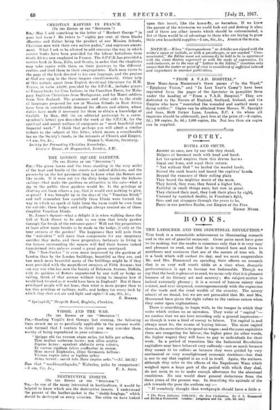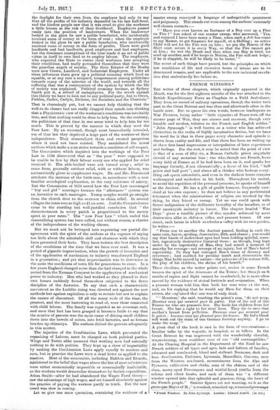B 0 0 K S .
THE LABOURER AND THE INDUSTRIAL REVOLUTION.• Tam book is a remarkable achievement in illuminating research and in the art of graceful summary. Croat pains most have gone to its making, but the reader is conscious only that it is very easy and pleasant to road, and that he is treated hero and there to antitheses and contrasts that are of the nature of true nit. It is a book which will outlast its day, and we mist congratulate Mr. and Mrs. Hammond on spending their efforts on research that is no very well worth while at a time when dramatic perfunctoriness is apt to become too fashionable. Though we say that the book is plena: nt to read, we mean only that it is pleasant because of its literary art and mastery ; the subject-matter is indeed extremely gloomy ; it is a record of 'human misery that existed, and ever deepened, contemporaneously with the expansion of the trade and the total wealth of the country. The misery admits of no denial, but we aro not persuaded that Mr. and Mrs. Hammond have given the right values to the various causes when they enter upon explanations.
There is something, to begin with, in the temper in which they write which strikes us as mistaken. They write of " capital "— we confess that we are horn recording only a general impression— as though it were a kind of enemy to labour. Yet capital is, and always must be, the moans of buying labour. The more capital there is, the more there is to spend on wages : and the more capitalists there are competing for labour, the higher price (in other words, the higher wages) they will have to pay to individuals for their work. In a period of transition like the Industrial Revolution capitalists may have behaved very callously—not so much became they meant to be callous as because they were guided by very mechanical or very unenlightened economic doctrines—but that is not to say that capital is an evil in itself. Again, the authors, although they refer to the effects of the Napoleonic Wars which weighed upon a large part of the period with which they deal, do not seem to us to make enough allowance for the abnormal conditions. No one would draw general deductions from the three years of the present war. In describing the ajaitude of the rich towards the poor the authors say
" If somebody thought that workpeople ehould have a little o
• TAc Torn Zotourer, MO-1812 : the Nee Cirilisafion. T.y I. L. Hammond .nd Barba.• HonunouL London: Unmans nod CO. MN, d1. ort.1 the daylight for their own lives, the employer had only to say that all the profits of his industry depended on his last half-hour, and the kindest people saw that it was cruel to give the workmen a little leisure at the risk of their livelihood. Employers passed easily into the position of landowners. When the landowner looked in the glass he saw a public benefactor, who incidentally received sums of money in the form of rent ; when the employer looked in the glass he saw a public benefactor, who incidentally received sums of money in the form of profits. There were good landlords and bad landlords, good employers and bad employers, but the dominant conceptions of the time made it an net of public virtue in itself to own .land or to employ labour. The employer°, who expected the State to coerce their workmen into accepting their Conditions, had really persuaded themselves that they were the guardian angels of society. The three Estates of the Realm were now Crown, Landlord, and Industrial Employers. Under all these influences there grew up a- political economy which bred an equable, or at any rate a resigned, temperament among politicians towards many of the miseries of the world, and towards all the suffering that was a consequence of the system by which the life of society was explained. Political economy became, as Sydney Smith put it, a school of metaphysics. For the revolt against this theory we have to look not to any political party, but to Owen, Fielden, Sadler, Carlyle, Dickens, the Socialists and the Chartists." That is charmingly put, but we cannot help thinking that the well-to-do classes had not really drugged their minds into thinking that a Physiocratie view of tho workman's conditions was inevitably true, and that nothing could bo done to help hint. On the contrary, the politicians of that time in ono sense tried to help him far too much. This is proved by the manner in whiCh they used the Poor Law. - By an unsound, though most benevolently intended, usq of that law they deprived a largo part of tho workerarof their independence. They demoralized. them and created pauperism where it need not have existed. They annihilated the moral motives which make a man strive towards a condition of self-respect- Tho Commission which inquired into the workings of the Poor Law in 1634 discovered that as " the poor " were supposed to bo unable to live by their labour every ono who applied for relief received it. Tho able-bodied were not turned away ; relief in some form, generally outdoor relief, with or without labour, was automatically given to supplement wages. Mr. and Mrs. Hammond attribute the increase of the birth-rate, in accordance with a now familiar sociological explanation, to the very existence of misery. But the Commission of 1634 noted how the Poor Law encouraged " boy and girl " marriages because tho " allowance " system was on-incentive to such marriages.. Young couples would go straight from the church door to the overseer to claim relief. In several Wages the rates rose as high c s £1 an ocro. And the Commissioners came to the startling but well-justified conclusion that " the discontentment in every parish is proportioned to the money spent in poor rates.". The " now Poor Lew " which ended this demoralizing system has been called, not without reason, a charter of the independence of the working classes.
But we must not be betrayed into expressing our partial dis- agreement with the spirit of the authors at the expense of saying too little about the admirable skill and clearness with which they have presented their facts. They have written the best description of the conditions of the time that we hays over read. It was a period of gigantic improvisation, when the growth of invention and of the application of mechanism to industry transformed England in a generation ; and yet that improvisation was to determine in tho main the conditions of town life for generations to corns. In a few years England changed more than she had changed in the whole period-from the Norman Confined to the application of mechanical power to industry. Mon who bad worked as they pleased in their own homes suddenly found themselves subjected to the fierce discipline of the factories. To any that such a characteristic movement as the Luddite rising was directed not against the now methods but against capitalism is only to restate but not to explain the causes of discontent, Of all the many evils of the time, the greatest, and the most harrowing to read of, were those connected with child labour. Tho family was regarded as an economic unit, and once that fact has been grasped it becomes futile to say that the avarice of parents was the main cause of driving small children down into the bowels of mines, into fetid factories, and as human brushes up chimneys. The authors defend the parents adequately in this matter.
The injustice of the Combination Laws, which prevented the organizing of Labour, must be charged on both political parties. Whigs and Tories alike assumed that working men had naturally nothing to do with politics. They kept up a show of impartiality by making the Combination Laws apply equally to masters and men, but in practice the Lassa were a dead letter as applied to the masters. Blest of the economists, including Malthus and Ricardo, ministered to the belief that wages above the lino of more subsistence wore either economically impossible or economically inadvisable, as the workers would demoralize themselves by foolish expenditure. Adam Smith—after he had abandoned the Wages Fund theory— ease the advantage of high tangos, and sot himself absolutely against the practice of paying the workers partly in truck. But the now
creed was slow in Conning. • • Let us give one more quotation, containing the evidence of a master swoop conveyed in language of unforgettable quaintness and poignancy. This stands out even among the authors extremely well-chosen extracts:— " ' Have you ever known an Instance of a Boy sent up a Flue An Fire ' was asked of one master sweep, who answered, ' Yes, and rejoiced I have been many a Time, when such a Job has come to my Master, to get Sixpence for myself, or a Shilling. ; an active Child will not let the Firo rest on him ; we pin the Bosom of the Shirt over, secure it in every Way, so that the Fire cannot get at him ; we wet the Brush and then when one Boy is tired, we send up another, and if he keeps in Motion, the Fire will not ledge ; if he is sluggish, he will be likely to be burnt.' " The worst of such things have passed, but the principles on which low conditions of life and excessive hours of labour are to be denounced remain, and are applicable to the now industrial revolu- tion that undoubtedly lies before us.



























 Previous page
Previous page